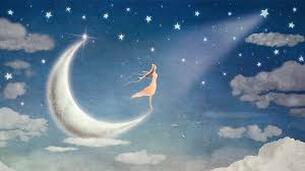 In many Western cultures, including our own, women rarely speak of menstruation. Even just a few years ago periods were expected to be kept hidden from men and even from fellow menstruaters. However in many hunter-gatherer societies it is seen as something to be celebrated. According to the Cherokee, a menstruating woman is described as powerful, she can ward off enemies and has the ability to heal the sick. Perhaps this is why in Western cultures women have been conditioned to keep their periods a secret, lest we become too powerful! Whatever the reason, one thing is set in stone; we are the only mammal to share the moon’s 29.5 day cycle. If you were to research whether the menstrual cycle ties in with the moon’s synodic cycle it would tell you that there is no correlation between the two. But I wonder what the studies would have said before modern industrialisation, when people were in the fields instead of the factories? What studies have been able to show is that women with longer cycles can shorten them by sleeping with the light on in the second phase of the cycle. There is also another interesting study that showed that women who conceived during a full moon were more likely to give birth to boys as a pose to women ovulating three days prior to the full moon. So what this tells us is that our hormones are sensitive to light exposure. We of course know this, as our production of Melatonin has a direct impact on Oestrogen levels. So ask yourself the question… When was the last time you looked at the moon? Would you even know which direction to look from your bedroom window? In this new world of tech, it’s no wonder we lost our way and our cycles are all over the place! Getting back to nature and taking some time to notice the moon in all its glorious phases must be a great place to start in getting us all back on track. Why not try plotting your last few cycles in line with the moon phases to see whether you’re on track. The day of your bleed (day 1) should be in line with the new moon, and the full moon should be in line with ovulation (day 14). Although there is no correlation in terms of the female cycle being linked to the moon’s, recent studies have shown that women whose cycles mirror the moon’s are more fertile. So there’s a reason we should be celebrating all things lunar! References: Lichterman, Gabrielle, www.hormonology.co.uk. Accessed 14th April 2020 [https://www.myhormonology.com/hormone-horoscope-does-the-moon-affect-your-menstrual-cycle/] Northrup, Christiane M.D, www.drnorthrup.com. Accessed 14th April 2020 [https://www.drnorthrup.com/wisdom-of-menstrual-cycle/]
0 Comments
Leave a Reply. |
AuthorVerity Allen - BSc, BA, MBAcC, Lic Ac Archives
April 2024
Categories |

 RSS Feed
RSS Feed
